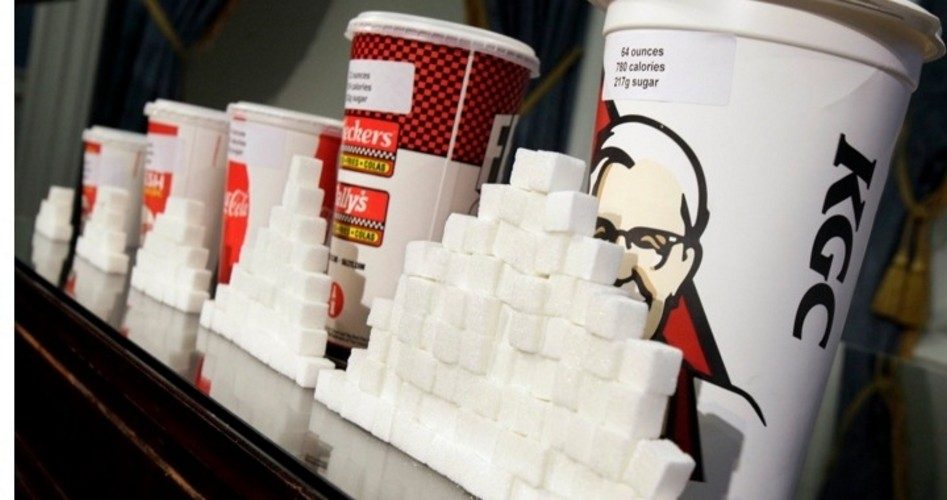
[J]
Next March, barring a successful legal challenge from the soda industry, New York will become the first city in the United States to restrict sales of large-sized sugar-sweetened drinks.
Perhaps feeling as if their municipality is being left behind in the race to control people’s lives, several District of Columbia councilmembers recently expressed their desire, or at least willingness, to consider a similar law for the nation’s capital.
During an October 20 debate among four of the seven candidates for at-large council seats, moderator Mark Segraves of WTOP radio asked the candidates: “Would you support a law restricting large sugary sodas similar to what New York City just passed?”
Incumbents Michael Brown (I) and Vincent Orange (D) “said without hesitation they would vote to ban the sale of large drinks,” Segraves reports. The other two candidates, both challengers, were split on the issue, with independent David Grosso favoring the ban and Republican Mary Brooks Beatty opposing it, according to the Washington Post’s Mike DeBonis.
After the debate, Segraves put the same question to five other councilmembers and found varying degrees of enthusiasm for such a law among them. Only one flatly refused to countenance such interference in individuals’ beverage consumption.
“I’m very excited by that [ban],” Councilmember Mary Cheh (D) told Segraves. “If I could get the votes to do it I would certainly try to put that in place.”
Cheh’s support for a soda ban is hardly surprising. In 2010 she sponsored legislation that would have imposed a tax on sugary drinks in the district, a measure that failed by a single vote.
“I know ‘nanny state’ and all that, but it’s appropriate for government to intervene at times to make sure that the choices that are presented are healthy for us,” she told Segraves.
That, needless to say, is a blank check for government meddling in private affairs. People make all kinds of choices that someone might consider unhealthful: eating Twinkies rather than peas, opting for skydiving over jogging, or reading The New American instead of the New York Times. Letting government decide which choices should be presented to people is a recipe for totalitarianism.
Other councilmembers were not quite as enthusiastic about a soda ban as Cheh, but some still thought the idea worth considering.
“The issue of nutrition is of critical importance to public health,” Council chairman Phil Mendelson (D) told Segraves. “We need to look at different strategies so people understand what the effect is of the large volume of soft drinks they’re drinking.”
“I am open to anything that will help young people be healthier,” Councilmember Tommy Wells (D) said in response to Segraves’ question.
Wells told DeBonis that “there would need to be certainly a broader discussion” about such a law before passing it, and he’s not in any hurry to do so. “We need to hear from the health officials in the city. I don’t know to the degree politicians should lead on this.”
Even Washington Mayor Vincent Gray agreed that a soda ban is a worthwhile pursuit while stopping short of fully endorsing one.
“I think there probably are some good health reasons to support something like that,” he told Segraves. “We’ll be happy to look at it; we haven’t taken a position on that one way or another.”
Meanwhile, Councilmember Jack Evans (D) “wasn’t ready to say no, but he’s a long way from voting yes for a ban,” according to Segraves, who reports that Evans told him, “I think sometimes we go too far in these areas.”
Sadly, just one officeholder interviewed by Segraves, Councilmember Muriel Bowser (D), expressed outright opposition to such a law, saying, “I think people can choose what to eat or drink.”
Given the level of willingness — and in some cases enthusiasm — to consider a soda ban among D.C. politicians, such a proposal might pass quite easily. Moreover, by the time they take up the matter, if indeed they do, the council will have the benefit of reviewing the outcome of the lawsuit against New York’s soda restrictions and can craft their legislation to avoid its pitfalls, making their law more likely to survive any challenges. In the meantime, D.C. residents and visitors alike may wish to take one last Big Gulp of libation liberty before it is snatched from them — “for their own good,” of course.
Photo of soft drinks and sugar cubes illustrating sugar content: AP Images

